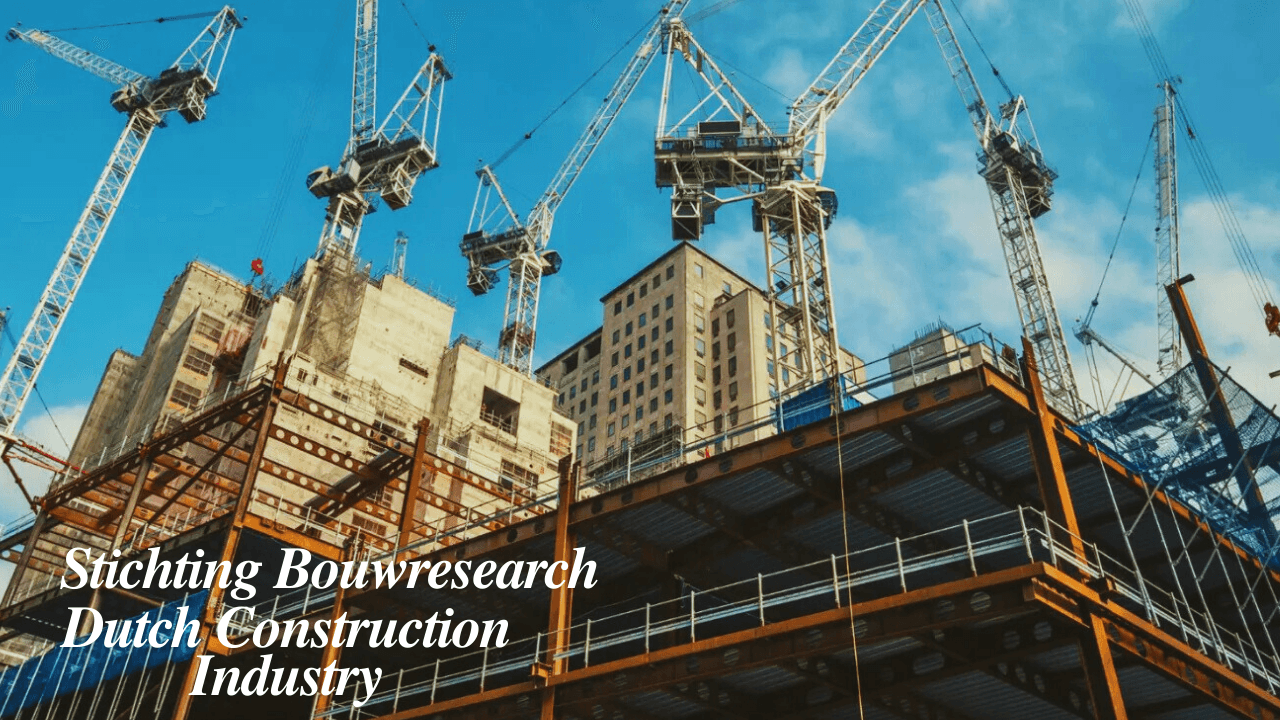Stichting Bouwresearch is a renowned Dutch foundation that plays a pivotal role in the construction and building industry in the Netherlands. Established to advance research and development in the construction sector, the organization has significantly influenced building practices and policies. Stichting Bouwresearch is committed to promoting sustainable construction methods, enhancing building standards, and fostering innovation within the industry. This article explores various aspects of Stichting Bouwresearch, including its history, objectives, areas of research, and impact on the construction sector.
The History and Evolution of Stichting Bouwresearch
Stichting Bouwresearch was established in the mid-20th century as a response to the growing need for research and development in the Dutch construction industry. During the post-war period, the Netherlands experienced rapid urbanization and industrial growth, which led to a significant increase in construction activities. The founding of Stichting Bouwresearch aimed to address the challenges associated with large-scale construction projects, such as quality control, sustainability, and safety. The foundation initially focused on conducting research to improve building standards, which laid the groundwork for modern building practices.
As the construction industry evolved, Stichting Bouwresearch expanded its scope of research to include emerging topics such as energy efficiency, sustainable materials, and smart building technologies. The organization has played a key role in shaping the regulatory framework for construction in the Netherlands, influencing building codes, safety regulations, and environmental standards. Over the years, Stichting Bouwresearch has grown into a prominent research institution, providing valuable insights and guidance to industry stakeholders.
Objectives and Mission of Stichting Bouwresearch
The primary mission of Stichting Bouwresearch is to promote research and development in the construction industry to improve the quality, safety, and sustainability of buildings. The foundation aims to achieve this by:
- Conducting Research: Stichting Bouwresearch conducts independent research on various aspects of the construction industry, including materials, techniques, and regulatory policies. The research aims to generate new knowledge that can be applied to improve construction practices.
- Promoting Sustainable Building Practices: A key objective of Stichting Bouwresearch is to encourage the adoption of sustainable construction methods. The organization focuses on reducing the environmental impact of buildings by advocating for energy-efficient designs, the use of sustainable materials, and waste reduction.
- Enhancing Building Safety: Stichting Bouw’s research is committed to improving building safety standards by conducting research on fire safety, structural integrity, and disaster resilience. The organization works closely with regulatory bodies to ensure that building codes reflect the latest safety requirements.
- Fostering Innovation: Stichting Bouwresearch encourages innovation in the construction industry by supporting the development of new technologies and materials. The foundation collaborates with research institutions, universities, and private companies to facilitate technological advancements.
- Influencing Policy and Regulation: The insights generated by Stichting Bouw’s research are used to inform public policy and regulatory frameworks for the construction sector. The foundation works with government agencies to implement evidence-based policies that promote sustainable and safe construction practices.
Areas of Research Focus for Stichting Bouwresearch
Stichting Bouwresearch covers a wide range of topics in its research activities, all aimed at advancing the construction industry. Key areas of research include:
1. Sustainable Building Practices
Stichting Bouwresearch prioritizes sustainability in construction, focusing on reducing the environmental impact of building activities. Research in this area includes the study of sustainable materials such as recycled concrete and low-carbon cement, energy-efficient building designs, and renewable energy integration. The foundation’s work has contributed to the development of green building standards and guidelines that are widely adopted in the Netherlands.
2. Energy Efficiency in Buildings
Energy efficiency is a major focus area for Stichting Bouwresearch. The organization conducts research to identify ways to reduce energy consumption in buildings, such as improving insulation, optimizing HVAC (Heating, Ventilation, and Air Conditioning) systems, and incorporating renewable energy sources. By promoting energy-efficient building designs, Stichting Bouw’s research aims to reduce the carbon footprint of the construction sector.
3. Building Safety and Risk Management
Stichting Bouwresearch researches to improve the safety of buildings and infrastructure. This includes studying the effects of natural disasters such as earthquakes and floods, as well as man-made hazards like fire and structural failure. The foundation’s research findings are used to update building codes and safety regulations, ensuring that new constructions meet the highest safety standards.
4. Innovation in Construction Materials and Technologies
Stichting Bouwresearch supports the development of new construction materials and technologies that enhance building performance. This includes research on advanced materials such as self-healing concrete, smart building technologies like automated control systems, and innovative construction methods such as 3D printing. The foundation aims to drive innovation by providing a platform for researchers and industry professionals to collaborate.
5. Urban Planning and Infrastructure Development
Urbanization presents unique challenges in terms of infrastructure and building requirements. Stichting Bouwresearch conducts research on sustainable urban planning, focusing on issues such as transportation, public space utilization, and infrastructure resilience. The insights generated help inform urban development policies that prioritize sustainability and livability.
The Role of Stichting Bouwresearch in Shaping Building Standards
Stichting Bouwresearch has a significant influence on building standards and regulations in the Netherlands. Through its research, the organization provides evidence-based recommendations to regulatory authorities, which help shape building codes and construction policies. The foundation’s work has contributed to the establishment of stricter safety requirements, higher energy efficiency standards, and more sustainable building practices.
For instance, Stichting Bouwresearch’s research on energy efficiency led to the development of stricter building codes that mandate the use of energy-saving technologies. The foundation also played a key role in the introduction of regulations for sustainable materials, which require the use of environmentally friendly products in construction projects. By continuously updating its research findings, Stichting Bouw’s research ensures that building standards keep pace with technological advancements and changing environmental conditions.
The Impact of Stichting Bouwresearch on the Construction Industry
The contributions of Stichting Bouwresearch have had a profound impact on the construction industry in the Netherlands and beyond. Some of the key impacts include:
1. Improved Building Quality and Safety
By conducting research on construction methods and materials, Stichting Bouwresearch has helped improve the overall quality of buildings. The foundation’s recommendations for structural safety and fire protection have been incorporated into building codes, leading to safer constructions. The implementation of these safety standards has significantly reduced the risk of accidents and structural failures.
2. Advancement of Sustainable Construction Practices
Stichting Bouwresearch’s emphasis on sustainability has influenced the adoption of green building practices throughout the construction sector. The foundation’s research on energy efficiency and sustainable materials has resulted in the widespread use of eco-friendly designs and technologies. This shift toward sustainable construction practices contributes to the reduction of greenhouse gas emissions and minimizes the environmental footprint of the building industry.
3. Promotion of Technological Innovation
Through its support for research on new construction technologies, Stichting Bouwresearch has played a crucial role in driving innovation in the construction sector. The development and application of cutting-edge materials and techniques, such as smart building technologies and 3D-printed structures, have been facilitated by the foundation’s initiatives. This has led to more efficient construction processes and improved building performance.
4. Influence on Policy and Regulatory Frameworks
Stichting Bouwresearch’s research findings serve as a valuable resource for policymakers and regulatory bodies. The foundation’s insights are used to develop and update building regulations, ensuring that they align with the latest industry standards and technological advancements. By providing evidence-based recommendations, Stichting’s Bouw research helps shape policies that promote sustainable and safe construction practices.
The Future of Stichting Bouwresearch and the Construction Industry
As the construction industry continues to evolve, Stichting Bouwresearch remains committed to addressing new challenges and opportunities. The foundation plans to expand its research activities to cover emerging topics such as digital construction technologies, circular economy principles, and climate adaptation strategies. Additionally, Stichting Bouw’s research aims to enhance its collaboration with international research institutions and industry partners to share knowledge and foster global innovation.
1. Digital Transformation and Smart Building Technologies
The future of construction lies in the adoption of digital technologies and smart building solutions. Stichting Bouwresearch recognizes the potential of digital transformation in improving construction efficiency and building performance. The foundation will focus on research related to Building Information Modeling (BIM), smart sensors, and automated construction processes to facilitate the integration of digital technologies into the industry.
2. Circular Economy in Construction
The concept of a circular economy emphasizes the reuse and recycling of materials to minimize waste and resource consumption. Stichting Bouw’s research aims to promote circular economy principles in construction by researching recyclable materials, modular building designs, and sustainable demolition practices. By encouraging the adoption of circular construction methods, the foundation seeks to reduce the environmental impact of the building industry.
3. Climate Adaptation and Resilience
With the increasing frequency of extreme weather events and changing climate patterns, there is a growing need for buildings to be resilient to environmental stressors. Stichting Bouw’s research plans to research climate adaptation strategies, such as flood-resistant building designs and heat-resistant materials. The foundation’s work will help ensure that future buildings can withstand the challenges posed by climate change.
Collaboration and Partnerships with Stichting Bouwresearch
Stichting Bouwresearch works closely with various stakeholders in the construction industry, including research institutions, government agencies, private companies, and industry associations. These collaborations enable the foundation to access diverse expertise and resources, facilitating comprehensive research and knowledge sharing. Key areas of collaboration include joint research projects, policy development, and the dissemination of best practices.
1. Academic Partnerships
Stichting Bouwresearch collaborates with universities and research institutions to conduct cutting-edge research on construction-related topics. These partnerships provide access to the latest scientific knowledge and technological advancements, enabling the foundation to stay at the forefront of industry trends. Additionally, academic collaborations allow for the training of future professionals in sustainable and innovative construction practices.
2. Industry Collaborations
The foundation works with construction companies, architects, and engineers to develop practical solutions to real-world challenges. Industry collaborations enable Stichting Bouw’s research to apply its research findings in actual construction projects, testing new materials, technologies, and methods. These partnerships also help the foundation understand the industry’s needs and adapt its research priorities accordingly.
3. Government and Regulatory Partnerships
Stichting Bouwresearch plays a key role in advising government agencies on construction-related policies and regulations. By working with regulatory bodies, the foundation ensures that building codes and standards reflect the latest research findings and industry practices. This collaboration helps promote a regulatory framework that supports sustainable, safe, and innovative construction.
Case Studies: Projects Supported by Stichting Bouwresearch
To illustrate the impact of Stichting Bouwresearch’s work, it is valuable to explore some notable projects that have benefited from the foundation’s research and support:
1. The Development of Energy-Neutral Housing
One of the key projects supported by Stichting’s Bouw research is the development of energy-neutral housing. Through research on energy-efficient designs and renewable energy integration, the foundation has contributed to the construction of homes that generate as much energy as they consume. This project aligns with the Netherlands’ goal of achieving a carbon-neutral built environment by 2050.
2. Structural Safety Improvements in High-Rise Buildings
Stichting Bouw’s research researched the structural safety of high-rise buildings, focusing on issues such as wind resistance and seismic stability. The findings were used to update building codes for high-rise constructions, resulting in safer skyscrapers that are more resilient to natural forces.
3. The Use of Recycled Materials in Road Construction
The foundation also supported research on the use of recycled materials, such as reclaimed asphalt, in road construction. This project aimed to reduce the environmental impact of infrastructure development by promoting the use of sustainable materials. The successful application of these materials has led to the adoption of greener road construction practices in the Netherlands.
Conclusion
Stichting Bouwresearch is a cornerstone of the Dutch construction industry, driving research, innovation, and policy development to improve building standards. The foundation has made significant contributions to the construction sector through its focus on sustainability, safety, and technological advancement. The organization’s ongoing commitment to research and collaboration with various stakeholders ensures that it remains a key player in shaping the future of construction.
As new challenges emerge, Stichting Bouwresearch will continue to promote sustainable and resilient building practices. By embracing digital transformation, circular economy principles, and climate adaptation strategies, the foundation aims to ensure that the construction industry evolves to meet the demands of a changing world.
Read More>>> Latest FintechZoom Meta Stock News & Updates










